
Looking back on your life, can you think of a time when you really thrived? You may have been doing a particular project, surrounded by positive people or whatever. What did you do right then to feel fulfilled?
Some achievers go through the stages of stages of striving and surviving before they thrive. One person said:
“I started my career in the 1980s and chose to go the journalistic route. Even though I had a good degree, this meant starting at the bottom as a researcher with a TV company.
“Eventually this led to me getting the chance to do presentation pieces for rolling news. Most of the work followed the news philosophy of: ‘If it bleeds it leads.’ I did my fair share of ambulance chasing and eventually my face became known.
“The constant striving was painful, however, and my personal life suffered. I got regular promotions. But the need to put in more hours – together with corporate infighting – took its toll.
“One day I just walked out. I had been for a health check which flagged warning signs. Whilst waiting for the test results, I was in a meeting where people were arguing about details.
“Looking at the great scheme of things, there seemed to be more important things in life. So the next day I resigned.
“Things did not work out overnight, but now I feel much more in control. I enjoy the oxygen of feeling in charge.
Some people do not need to go through the stages of striving and surviving. They develop a pattern of thriving. If you wish, try tackling the exercise on this theme. This invites you to do the following things.
Describe a specific example in the past when you thrived.
Describe the specific things you were doing right then – and the conditions around you – that enabled you to thrive.
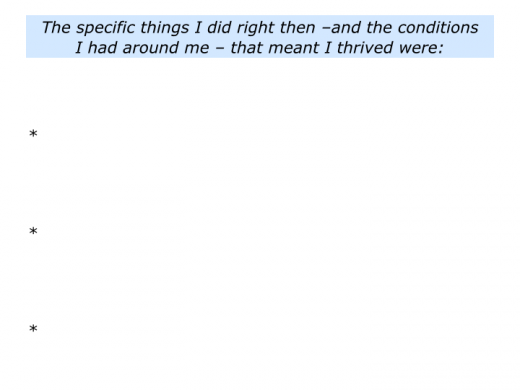
Thriving In The Future
Many achievers enjoy striving. They love to learn, develop skills or grow by tackling challenges. But it is important to remember the principle that:
People can grow by going for stretch goals, but they can hurt themselves by going for surgery goals.
They can reach the first type of goals by stretching and, in the process, they can develop. But the second set – going for unrealistic goals – creates the possibility of doing real damage.
People can survive for a time when aiming for surgery goals by numbing themselves to the pain. The same rule holds true for many systems – whether these be individual people, teams, organisations, societies or even belief systems. The key is to take heed of the warning signs.
Different people – and different systems – exhibit different kinds of warning signs. In the case of organisations, for example, this often take the form of trying to patch up existing infrastructures which, as we may be told: “Are no longer fit for purpose.”
“Looking back, the warning signs had been there for years,” said the former TV journalist.
“But I fell for the cliché that if I worked smarter things would get better. Sure, I found ways to be more efficient, but I then took on more jobs. I ended up trying to work both harder and smarter. After walking out I collapsed for a week.
“Some people explore different kinds of therapies after such an experience. But my approach was to look for another job, mainly in Public Relations. This led to several part-time contracts, some of which were satisfying, some less so.
“Eventually I set up my own firm, mainly working with social enterprises. I now use my communication skills to help people who are doing worthwhile work. This provides enough money to live and I have started to take care of my health.
“Like some other journalists, I moved on to the philosophy of: ‘If it succeeds, it leads.’ As you know, Constructive Journalism aims to offer solutions, rather than just problems. This also feels better for my soul.
“I’m not sure what will happen in the future, but the years of speaking to camera on TV taught me to live off my wits. The next few years promise to be very interesting.”
Looking at your own life and work, how can you continue to thrive? One approach is to focus on the kinds of the projects, people and places that give you energy. Bearing this in mind, it can be useful to explore the following themes.
Project. What is the kind of project – personal or professional – that you find stimulating?
People. Who are the kinds of people – personal friends or professional colleagues – that you find stimulating?
Place. What is the kind of place – culture and environment – that you find stimulating?
If you wish, try tackling the exercise on this theme. This invites you to do the following things.
Describe the specific things you can do to ensure that – as far as possible – you thrive in the future.
Describe the specific benefits of doing these things – both for you and for other people.


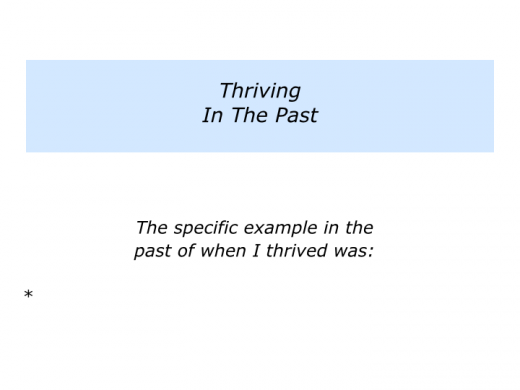
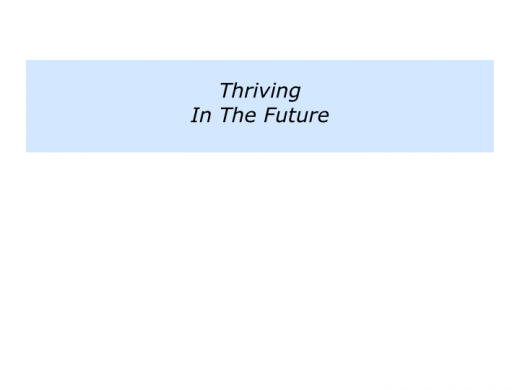
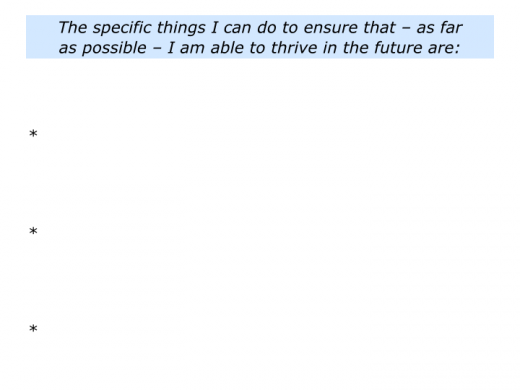
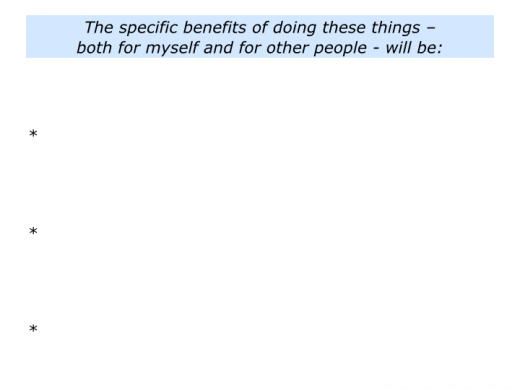




Leave a Reply